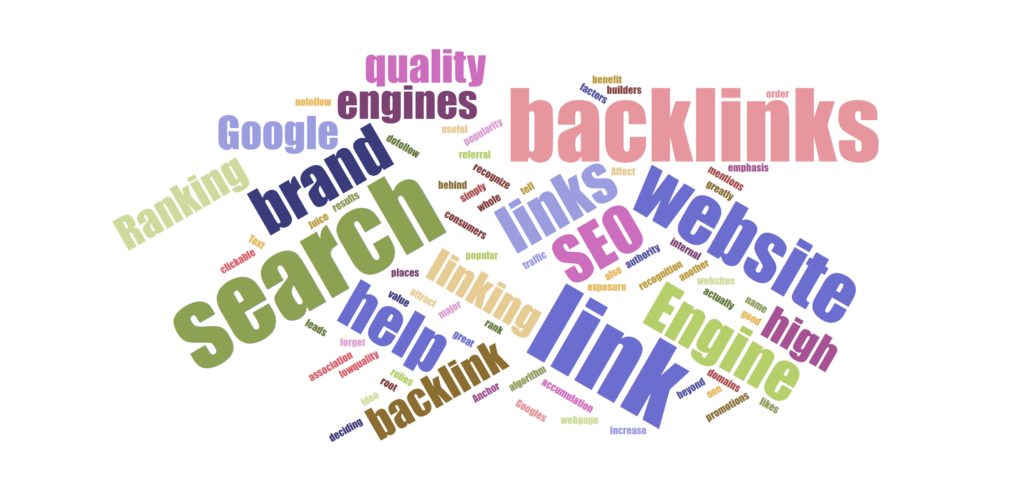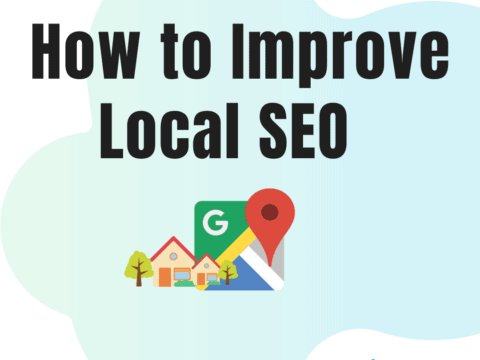What Are Backlinks?

A backlink is when one website mentions another website by linking to it. The link has to be a clickable link in order for search engines to recognize them as backlinks. For example, using Twinword, https://www.twinword.com will not count as a backlink but https://www.twinword.com will. High quality backlinks are major deciding factors that help your website increase its rank in search engine results. In addition, these backlinks should be on sites with related content. Furthermore, these sites should be authoritative sites that are in high ranking positions. The more high-quality backlinks from different sites you have, the higher your ranking is.
Why Backlinks?
- Brand Recognition/Exposure
When people are reading content online they notice the links first. If they see your website mentioned over and over throughout an article, your brand will automatically be associated with that article topic in a person’s mind. The way search engines recognize links on your site and indicate your site has useful information, consumers also see that and it indicates for them to take an interest in your brand. - New Lead/Relationships
Having a lot of backlinks can get you to make new friends, leads and maintain a relationship with your consumers. When someone reads a good post and sees a backlink pointing to the source, there is a good chance that they will click on the link to learn more about who and where that article was from. If that person really enjoyed your post then they might follow you on social media. A simple link can bring consumers to your website without the aid of search engine rankings. - Promotion
Backlinks are a way of promoting your website or products through commenting on credible sites and sharing on social media. If the pages you are trying to rank have poor/basic content, you will have a hard time trying to rank higher on search engines. - Referral Traffic
Even though most traffic comes from search engines, some of them come from referrals. Referral traffic means that people are clicking on links within content and being taken to the linked content. Most of the time, referral traffic is targeted and has a low bounce rate. - Organic Ranking
Organic search results are results that have relevant keywords to the original search term. In contrast to non-organic results which are pay-per-click advertisements. Backlinking contributes to search engine rankings. If your post is getting links from other websites, it will rank higher with search engines.
Related Vocabulary

- Link Juice: This term is used to reference the value of a hyperlink to a certain website or page. When a website or post links to your site, it passes ‘link juice’ which helps you ranking on search engines. For example, if page A links to Twinword, it passes link juice to Twinword helping it rank higher on search engines. The higher the quality of the link is, the more link juice it passes.
- No-follow Link: These links do not give any link juice to the website/page and do not count toward search engine ranking. If you do not want the website you are referencing to increase in ranking, use the no-follow link. An example of a no-follow link in HTML is <a href=”http://www.website.com” rel=”nofollow”>Text</a>.
- Do-follow Link: All links by default are do-follow meaning they will pass link juice until you make it a no-follow link.
- Anchor Text: This text is the clickable blue underlined text in a hyperlink. These work well when you are trying to rank in certain keywords. Instead of the link saying “Click Here”, it should be replace with the name of the page it leads to or the keywords it represents (eg. “social media management tool”). Do a little keyword research to find popular keywords to describe the linked page.
- Linking Root Domains: This refers to the number of links that are linking back to your website from the same domain. Even if your site is mentioned many times on a certain domain, search engine will only count a limited set of them.
- Internal Links: Links that go from one page to another within the same website is called an internal link or interlinking.
- Low-quality Links: Links that come from spam, automated, etc. sites are low-quality link and can hurt your webpage ranking.
How To Build Backlinks
Backlinking should be one of the main priorities for your website SEO because of the importance of search engine ranking.
- Posting
Write articles containing popular keywords that relate to your website/company/product. If you do not know where to start your keyword research for your site, this keyword tool can help you find what you are looking for. - Commenting
Posting comments on other articles that relate to your website or product can be beneficial. When you start commenting make sure to reference your website/product that relates to that article. You never know who is going to write an article about your site or give you a backlink. - Tracking
It’s important to keep track of your backlinks so that you know which websites are linking back to you. You can make an excel spreadsheet and keep track of the date, websites, contact information and comments.
Backlink Tools
Here are a few backlink tools to help you get started and monitor your links as well as your competitors.
- Check My Links (Google Chrome Plugin)
- Linkbird (Free/$)
- Pitchbox ($)
- Monitorbacklinks (Free/$)
- Linkody (Free/$)
Get Started Now!
Building backlinks can be time-consuming but worthwhile. This should be one of your main priorities for your site’s SEO because of the importance of search engine ranking. I hope this article helped you to better understand backlinks, their effect on search engine rankings and why you should focus on building backlinks. Start backlinking today! If you need a tool to help you get ideas or related posts, check out this trending keyword tool.
Tell us your experience with backlink building! If you have any suggestions, questions or recommendations, feel free to leave a comment down below.




42 Comments
thank you for sharing an informative topic,this is useful.
Thanks for the info
Thank you so much for usefull Information. I Liked your post.
Your Blog Is Excellent. With Good Source To Find A Better Knowledge Content Creation Was Mind Blowing. Every Point Is Explained Very Clearly And No Doubt Continue Waiting For Your Upcoming Blog.
The most detailed article about SEO ever! Thanks
Loved the content!
Hi, This is an informative article. Thanks for sharing your experience & knowledge.
Thanks for this blog.
Thank You for sharing an article, i got great information in this blog post, again thanks a lot ….
Thank you for the post on link building. It is really very important for every website to have relevant and high authority links.
That’s really nice post. I appreciate your skills. Thanks for sharing.
Thank you for all of the information. It seems like there is so much to learn! I will surely use this as my guide as I am currently writing and promoting my content about uae delivery services. Thank you for sharing this with us.
Hey there,
There something new for this article so amazing and I appreciate to read this.
Thank you for sharing.
great article.
The most detailed article about SEO ever! Thanks
Nice post! The information you provided is very helpful if someone is planning to SEO on our website. I think is a better platform to do SEO of your Website.
Thanks for sharing such important articles. This is really helpful for blog commenting. I was badly looking for some blogs commenting sites but none were useful. This is a very helpful piece. Please keep sharing the knowledge.
Super long article with lots of information “bookmarked!” I will target long tail keyword first.
SEO is changing process. It is evolving with the time.
I recently came across your blog and have been reading along. I thought I would leave my first comment. I don’t know what to say except that I have enjoyed reading. Nice blog. I will keep visiting.
What a well written and structured article full of information and motivation. I love that. Thanks for sharing this awesome piece of information. Thanks for the nice post.
hi nicely explained post. can comenting on post can also boost do follow backling?
Hi there, unfortunately blog comments are all no follow backlinks, so they won’t be helpful for your DR.
definitely a very informational article. Can we build a link ourselves self I mean Social bookmarking PR Submission etc??
Hi Jonathan,
You can indeed build links yourself through press releases etc., however, nowadays most press release links are nofollow links. Nonetheless, they will bring you some brand and product mentions. To increase your Pagerank though, you’ll need some high quality dofollow links which you can get through either reaching out and asking for links, through guest posting, or through other ways such as an affiliate program.
Hi,
great work ! but my question is that can you help me with which are those links which google does not consider to rank page?
Hi Shafaq,
Thanks for your comment! Nofollow links have no effect on a site’s PageRank.
I hope that helps!
Best regards,
Denise
very nice thanks for sharing the information
Very helpful article .thank’s
I’m having a hard time right now getting on the first page of Google, and this article is really helpful.
Thanks for sharing such important articles. This is really helpful for blog commenting. I was badly looking for someblog commenting sites but none were useful. This is a veryhelpful piece. Please keep sharing the knowledge.
I was glued with everything you said. I Couldn’t agree more. Much thanks for sharing such insights with your readers. This was very informative. Keep the good work up 🙂
Hmm it appears like your website ate my first comment (it was super long) so I guess I’ll
just sum it up what I had written and say, I’m thoroughly enjoying your blog.
I as well am an aspiring blog writer but I’m still new to the
whole thing. Do you have any points for novice blog writers?
I’d really appreciate it.
Hi there, great to hear you enjoy our blog!
We have a post on basic SEO that should cover everything you need.
In regard to backlink building, make sure to focus on high quality content and then people will naturally link to your content. It also never hurts to reach out to other sites that are talking about the topic that your posts cover and ask them if they would be willing to give you a link. We have another post about easy backlink building methods that might be helpful for you.
Nice article I love it
Nice Article you have made here, It’s an informative and interesting post, keep it up.
Thank You.. Have a Nice Day ..
Great work! This list will surely help many of us, thank you.
Нi! І’m at ᴡork surfing aгound your blog from mmy new iphone 4!
Јust ѡanted to say I love reading thгough yоur blog aand ⅼook forrward too all your posts!
Carry on the fantastic work!
thanx for such a useful info
I have to agree with all your inclusions such great information that will be very useful, Thank you for sharing this great blog.
Thanks for this information about backlinks, I want to ask, is purchasing backlinks advised
Hi Franklyn, glad you liked the post!
Purchasing backlinks is definitely not advised as it is against Google’s Webmaster Guidelines.
Best regards,
Denise
I impressed by the quality of information on this website. There are a lot of good resources here. I am sure I will visit this place again soon.